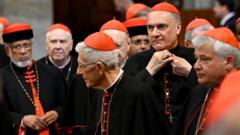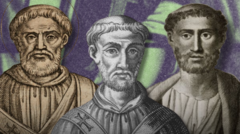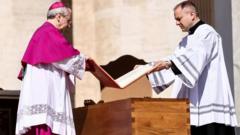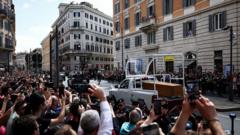Despite calls for significant shifts in doctrine, Pope Francis emphasized dialogue over decisive action during his tenure.
Pope Francis: A Papacy of High Expectations and Unmet Hopes

Pope Francis: A Papacy of High Expectations and Unmet Hopes
The late Pope's reign sparked aspirations of reform, yet left many yearning for more radical change.
When Pope Francis convened Roman Catholic bishops in 2019 to evaluate the possibility of ordaining married men in isolated regions of South America, it kindled hopes for significant reforms to the celibate priesthood. The bishops advocated for this change, and Francis had previously expressed a desire for grassroots transformation within the Church. However, in the end, he hesitated, concluding that the Church was not prepared to abolish a tradition that had stood for nearly a millennium. This decision left many advocating for progressive change feeling disillusioned, despite their initial excitement over his papacy.
Upon reflection, Francis’s papacy proved to be one marked by soaring expectations. Amid his charismatic and unorthodox leadership style, Catholics from various ideological backgrounds projected their deepest desires and apprehensions onto him, often detaching their expectations from his actual words or actions. For many liberal Catholics, there was a glimmer of hope that Francis might endorse women priests, revise teachings on birth control, or support same-sex unions and marriage; yet, they overlooked his role as the head of a highly conservative institution.
On the flip side, some conservative observers, driven by apprehension over Francis’s progressive rhetoric, even speculated about his allegiance to socialist ideologies. However, despite their fears, he never made any drastic alterations to Church doctrine. Ultimately, his legacy is one of a leader who navigated these tensions, prioritizing conversation and engagement over radical change, leaving behind both a legacy of hope and a landscape of unmet desires.
Upon reflection, Francis’s papacy proved to be one marked by soaring expectations. Amid his charismatic and unorthodox leadership style, Catholics from various ideological backgrounds projected their deepest desires and apprehensions onto him, often detaching their expectations from his actual words or actions. For many liberal Catholics, there was a glimmer of hope that Francis might endorse women priests, revise teachings on birth control, or support same-sex unions and marriage; yet, they overlooked his role as the head of a highly conservative institution.
On the flip side, some conservative observers, driven by apprehension over Francis’s progressive rhetoric, even speculated about his allegiance to socialist ideologies. However, despite their fears, he never made any drastic alterations to Church doctrine. Ultimately, his legacy is one of a leader who navigated these tensions, prioritizing conversation and engagement over radical change, leaving behind both a legacy of hope and a landscape of unmet desires.



















